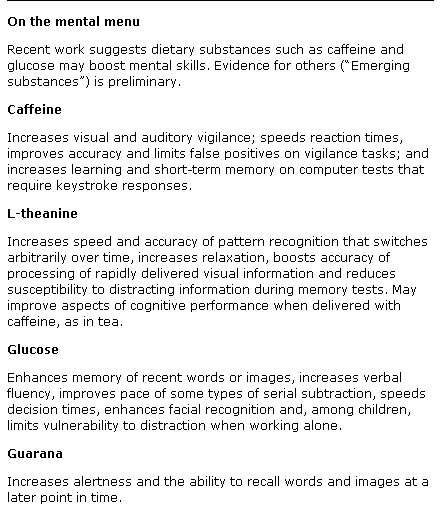 Science News just published an easy to read review article on what the latest scientific studies reveal about nutritional supplements and brain function. The evidence that certain supplements are brain boosters is really mounting. The “mental menu” shown to the right is taken directly from the article.
Science News just published an easy to read review article on what the latest scientific studies reveal about nutritional supplements and brain function. The evidence that certain supplements are brain boosters is really mounting. The “mental menu” shown to the right is taken directly from the article.
This means for example, a snack including caffeinated tea and a sugary treat should produce a short-lived but intense boost in mental energy and cognitive performance.

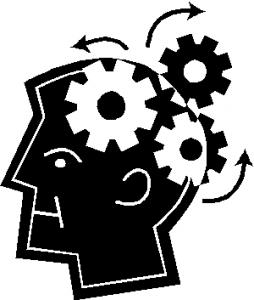 Prolonging mental focus is not about taking a rest break but momentarily switching to a task to get a jolt of mental energy or novelty.
Prolonging mental focus is not about taking a rest break but momentarily switching to a task to get a jolt of mental energy or novelty.
Staying focused on a specific task or topic can be difficult. Called vigilance or our ability to “keep watch” it is vitally important for top mental performance in any field. As such we will cover scientific studies on how to improve mental focus and vigilance on the Next Brain Blog.
For example, new research from University of Illinois reported in the journal Cognition found that brief diversions from a task actually vastly improves your mental focus. While we all know you need to take breaks to stay fresh, this finding is different.
Test subjects in this study memorized four digits (four different numbers each less than 10) before taking on a different mental task for 50 minutes. Subjects were told to signal if they saw one of the digits flash on the computer screen they were working with. Some of the test subjects were shown digits during work on the 50-minute task (called the switch group) others were not. There was also a control group that knew nothing about the digits but saw them during the task. Here is what they found:
“As expected, most participants’ performance declined significantly over the course of the task. But critically, Lleras said, those in the switch group saw no drop in their performance over time”.
The brief diversions rather than hurting mental focus provides the novelty that we need to stay focus. We lose mental focus when nothing changes. We get bored and details fad into the background.
Note the switch group did not take a five minute break, they did not even take a 1 minute break. It is not about resting. It is about getting a small jolt of mental energy or novelty.
You can improve cognitive performance on long tasks by momentarily switching to tasks that provide a small dash of mental novelty. Interested to hear from readers that use this technique. What small diversions or switching tasks do you use?
 Here on the Next Brain Blog I have posted several times on the value of taking a walk for stimulating thinking, lowering stress and forestalling the effects of age-related cognitive decline. Even small amounts of walking can produce dramatic results. For example, check out the new research from University of Illinois at Urbana-Champaign that found:
Here on the Next Brain Blog I have posted several times on the value of taking a walk for stimulating thinking, lowering stress and forestalling the effects of age-related cognitive decline. Even small amounts of walking can produce dramatic results. For example, check out the new research from University of Illinois at Urbana-Champaign that found:
Walking 40 minutes three times a week on a regular basis increases the size of your hippocampus (area of brain where memories form) and effectively slows normal cognitive decline by two years in adults ages 50 to 80 years.
This is a powerful finding because normally our hippocampus decreases in volume 1-2% per year as we age.
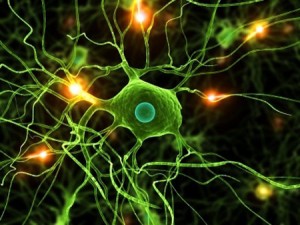 Our thinking and decision-making is strongly shaped by what has worked in the past. Success is compiled into rules and mental sets that make us more efficient but also blind us to innovative alternatives. If we could safely disrupt the applications of mental sets at the right time we might enhance our creativity. That idea was recently tested using transcranial direct current stimulation (tDCS) by researchers at the Center for the Mind.
Our thinking and decision-making is strongly shaped by what has worked in the past. Success is compiled into rules and mental sets that make us more efficient but also blind us to innovative alternatives. If we could safely disrupt the applications of mental sets at the right time we might enhance our creativity. That idea was recently tested using transcranial direct current stimulation (tDCS) by researchers at the Center for the Mind.
The experiment involved 60 subjects that were given a creative problem to solve. Some received a small electrical current applied to their brain in a region thought to hold mental sets that guide our problem solving. The results were dramatic:
“Only 20% of participants solved an insight problem with sham stimulation (control), whereas 3 times as many participants did so…”
A strong effect but one that needs to be repeated and further explained using brain scanning studies.
Only a tiny amount of electrical current is being used in tDCS. It has been the focus of other studies designed to enhance cognitive performance. We covered one from Oxford University in an earlier post on the Next Brain Blog.
I am interested to hear from readers about how low-level direct current is being used to stimulate cognitive performance.
 Systematic brain training using software to improve your cognitive performance is a relatively new technique. The software acts like a brain gym working your memory, visual cognition, speed of processing, numeracy, decision-making skills and the like to make them bigger and stronger. More than 10 vendors will sell you a package and program ranging in price from $20 to hundreds. We have covered most of them here on the Next Brain Blog.
Systematic brain training using software to improve your cognitive performance is a relatively new technique. The software acts like a brain gym working your memory, visual cognition, speed of processing, numeracy, decision-making skills and the like to make them bigger and stronger. More than 10 vendors will sell you a package and program ranging in price from $20 to hundreds. We have covered most of them here on the Next Brain Blog.
But does it work? And does it work better than solving crossword puzzles, playing video games or other mentally stimulating things we do for fun? There is compelling evidence that brain training software has impact it is just not clear how much.
So I am always on the lookout for new studies that look at the effectiveness of brain training software. For example, Posit Science recently publish a synopsis of two studies done in 2010. Note Posit Science sells brain training software but the studies were conducted by academic researchers in neuroscience and psychology. These are interesting because both studies show improvement in cognitive performance on tasks outside the training software. One even demonstrated a 50% reduction in at-fault car crashes over a six year period:
“This study looked at crash records for 908 older drivers who trained on a version of Posit Science’s Road Tour exercise six years earlier. Road Tour expands “useful field of view,” how much a person can take in with a single glance. Useful field of view is critical to safe driving: a wider field can help drivers spot dangers in their peripheral vision in time to react. The study authors found that training with the Road Tour technology (called “speed-of-processing training” in the study) cut a driver’s crash risk. In fact, they were responsible for about 50% fewer crashes than their untrained peers. Road Tour is available as part of both the InSight and DriveSharp brain fitness programs.”
This is an important result. It shows that brain training software can improve the cognitive performance of older adults enough to impact an important daily activity.
Interested to hear from readers that use brain training software. How does it improve your cognitive performance in daily life?
A reader shared an experience they had with LearningRx a consumer center for brain training. They promise to improve your academic performance by providing coached training on a full range of cognitive skills (see diagram).
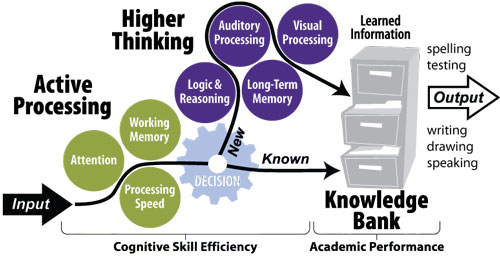
The process starts with a formal assessment using the Woodcock-Johnson assessment for cognitive abilities (partially shown below).
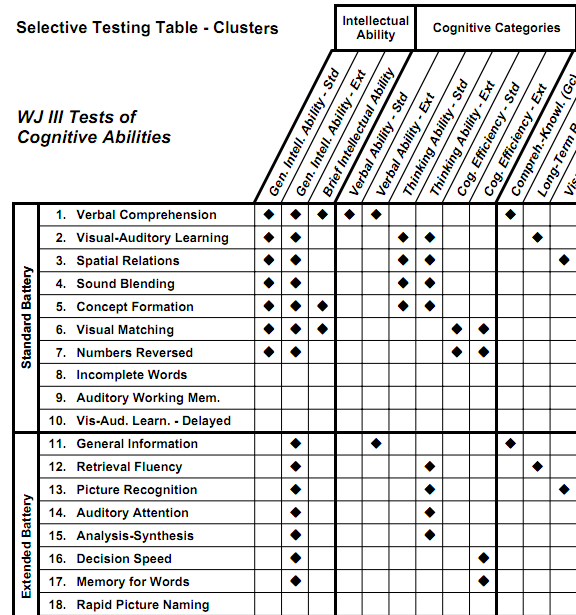
You are then matched with a coach and work 3-5 days per week for an hour a day for 3 months. They claim a 3.6 year improvement on the cognitive assessment and have some studies to back it up.
LearningRx has centers across the US and they want to open more using a franchise approach. Interested to hear from other readers that have used this service.
 Scents and odors have a swift and powerful impact on our brains. They can trigger memories and moods and signal the intentions and feelings of others. But can specific scents be used to improve our brain function and cognitive performance?
Scents and odors have a swift and powerful impact on our brains. They can trigger memories and moods and signal the intentions and feelings of others. But can specific scents be used to improve our brain function and cognitive performance?
There are scientific studies that suggest the scent of vanilla, cinnamon, roses and peppermint impact attention, memory and mental energy.
For example, a recent study in the North American Journal of Psychology pointed out:
“Past research indicates the odors of peppermint and cinnamon (1) enhance motivation, performance, and alertness, (2) decrease fatigue, and (3) serve as central nervous system stimulants.”
I could not find many scientific studies. The impacts they measure are not large or sustained.
There are also some suggested uses of odor in brain training, especially in the approach called neurobics. For example, in the book Keeping Your Brain Alive, the authors suggest:
- Wake up and smell the vanilla: Release the smell of an extract (vanilla, citrus, peppermint or rosemary) just as you awake every morning for a week.
- The scent of music: Sniff specific odors while listening to a song to stimulate novel sensory associations in your brain.
Scent can be delivered from simple cotton balls, plug-in devices, sprays or oils spread by small fans in low-cost electric aromatherapy diffusers. This makes it relatively easy to experiment with scents and cognitive performance. For example, scenting a room while studying, taking sniffs of specific scents just before or after a mental task and so on.
Interested to hear from readers that use scent to boost performance or as part of a brain training routine.
 Music stimulates our brains and can support peak cognitive performance in many ways. A new study at McGill University has revealed part of the reason – pleasurable music releases dopamine, a powerful neurotransmitter that the brain uses as a reward. The researchers also found that the stronger the emotional reaction to the music the more dopamine that is released. Some details:
Music stimulates our brains and can support peak cognitive performance in many ways. A new study at McGill University has revealed part of the reason – pleasurable music releases dopamine, a powerful neurotransmitter that the brain uses as a reward. The researchers also found that the stronger the emotional reaction to the music the more dopamine that is released. Some details:
The team at The Neuro measured dopamine release in response to music that elicited “chills”, changes in skin conductance, heart rate, breathing, and temperature that were correlated with pleasurability ratings of the music. ‘Chills’ or ‘musical frisson’ is a well established marker of peak emotional responses to music. A novel combination of PET and fMRI brain imaging techniques, revealed that dopamine release is greater for pleasurable versus neutral music, and that levels of release are correlated with the extent of emotional arousal and pleasurability ratings.
You can listen to the music they used in the study here.
Pleasurable music is a powerful and natural source of mental energy. Need a brain boost? Turn to your iPod.
Interested to hear from readers that use music in their brain training or physical workout routines.
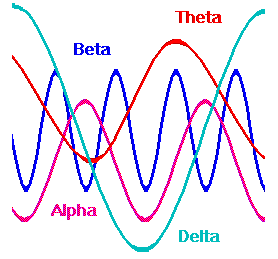 Learning to control your brainwaves through concentration, relaxation, visualization, meditation and other techniques is a cornerstone for peak cognitive performance. Learning to control your brainwave is often difficult because you don’t have direct and immediate feedback on what state you are in. Neurofeedback devices that display information about brain states in real-time solve that problem. The devices work on a brain-to-computer interface and have recently move into the consumer market.
Learning to control your brainwaves through concentration, relaxation, visualization, meditation and other techniques is a cornerstone for peak cognitive performance. Learning to control your brainwave is often difficult because you don’t have direct and immediate feedback on what state you are in. Neurofeedback devices that display information about brain states in real-time solve that problem. The devices work on a brain-to-computer interface and have recently move into the consumer market.
You can get simple models for home use and they have been built into games.
Neurofeedback offers one of the best hopes for a breakthrough in brain training and peak cognitive performance.
So I am always on the look out for new consumer-level neurofeedback devices that might be of interest to readers of the Next Brain Brain blog. Mattel has announced a new version of their Mindflex mental acuity game, call Mindflex Duel: The cost is $99. Here is the short story:
“Using advanced technology, Mindflex Duel headsets sense brain activity and send messages to the game platform. Strap on a headset, connect the sensor clip to your earlobe, and align the strap’s metal sensor so it’s flush against your forehead. Your brain activity will trigger the game platform’s motors, which will propel the ball. Bulk up your brain, sharpen your focus, and battle your friends with this hands-free challenge!”
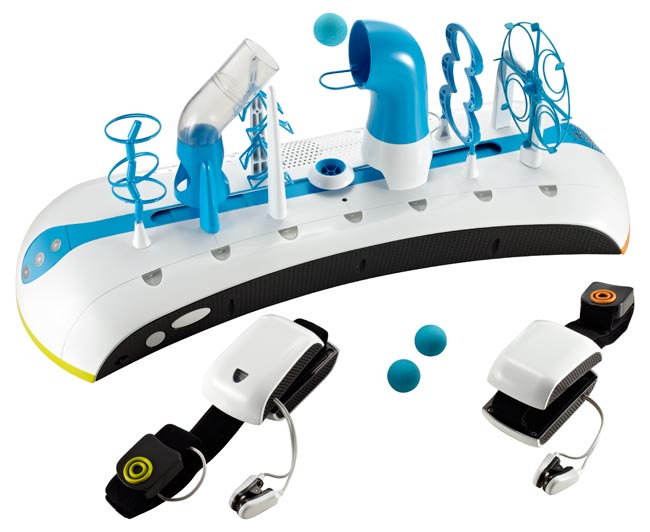
Being able to do neurofeedback in a competitive mode could be a big step forward in using the technology for brain training.
Very interested to hear from readers that use home-based neurofeedback to improve brain function and achieve peak cognitive performance.
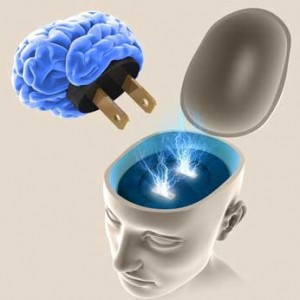 Newsweek did a great job of summarizing the findings from the cognitive enhancement strategies workshop held at the 2010 annual meeting of the Society of Neuroscience. The article, Can You Build a Better Brain? uses the latest neuroscience to differentiate between techniques that work and those that don’t. Techniques for improving brain function and enhancing cognitive performance that have strong scientific support include:
Newsweek did a great job of summarizing the findings from the cognitive enhancement strategies workshop held at the 2010 annual meeting of the Society of Neuroscience. The article, Can You Build a Better Brain? uses the latest neuroscience to differentiate between techniques that work and those that don’t. Techniques for improving brain function and enhancing cognitive performance that have strong scientific support include:
- Drugs that boost dopamine levels such as caffeine
- Regular aerobic exercise
- Meditation training
- Activities that boost mood and confidence
- Action-oriented video games
- Cognitive training software but only for the tasks done using the software
All of these techniques have been covered in the Next Brain Blog. Techniques that don’t appear to have strong evidence include, and I quote:
“Vitamins B6, B12, and E; beta carotene; folic acid; and the trendy antioxidants called flavenoids are all busts, and the evidence for alcohol, omega-3s (the fatty acids in fish), or having a large social network is weak. The Mediterranean diet is associated with a lower risk of cognitive decline, find observational studies, but that hasn’t been confirmed in more rigorous, randomized controlled studies, and no one knows whether the benefit comes from what the diet includes (olive oil, fish, vegetables, wine) or what it excludes (red meat, refined sugars, dairy fat). Statins don’t help, and neither do estrogen or NSAIDs (aspirin, ibuprofen).”
Although some of these have supporting studies they lack a clear causal connection to brain plasticity or other currently understood mechanism of cognition.
 Science News just published an easy to read review article on what the latest scientific studies reveal about nutritional supplements and brain function. The evidence that certain supplements are brain boosters is really mounting. The “mental menu” shown to the right is taken directly from the article.
Science News just published an easy to read review article on what the latest scientific studies reveal about nutritional supplements and brain function. The evidence that certain supplements are brain boosters is really mounting. The “mental menu” shown to the right is taken directly from the article.











